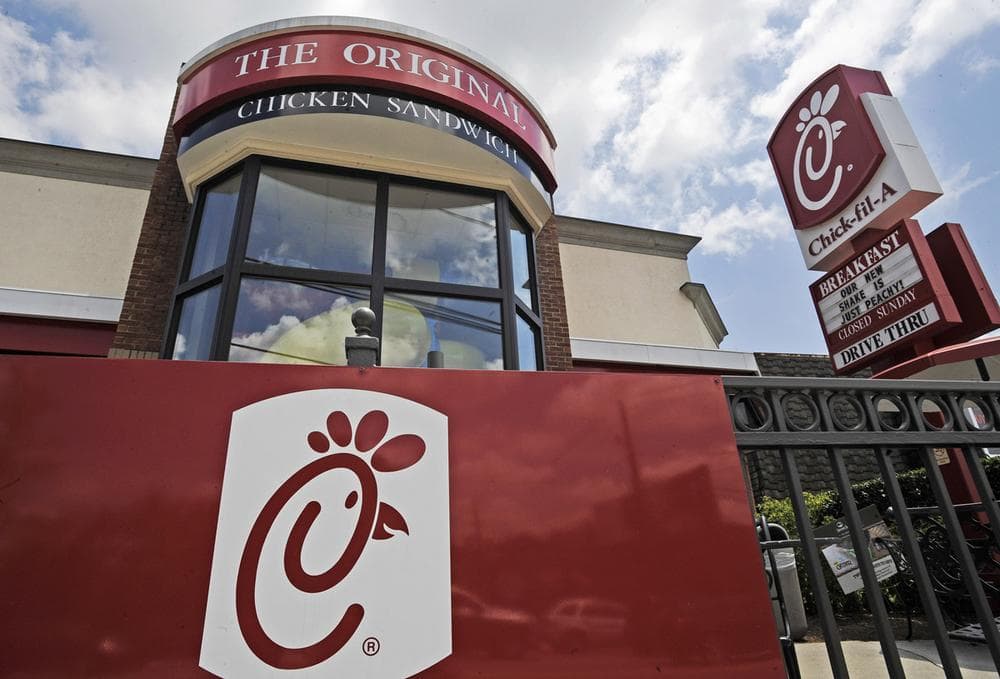Advertisement
Chick-fil-A And The Value Of Values

“Love your food and your family values!!!” gushed a commenter on Chick-fil-A’s Facebook page last week. When CEO Dan Cathy proudly told the Biblical Recorder that he was “guilty as charged” of supporting traditional family values, he started a food fight, with battles ranging from a "same-sex kiss-in at your local Chick-fil-A" to Mike Huckabee’s brainchild, "Chick-fil-A Appreciation Day." Boston’s own Mayor Thomas M. Menino has declared that a company that “discriminates against a population” does not belong in our city, and that he will block attempts to open Chick-fil-A franchises here, including a planned Freedom Trail location.
People everywhere are rushing to take a stand on the “family values” that Dan Cathy espouses: either for or against them. Yet Cathy barely even identified what those values are, saying only, “We are very much supportive of the family – the biblical definition of the family unit….We want to do anything we possibly can to strengthen families.” Of course, this “biblical definition” is far from clear, as Huffington Post blogger Domenick Scudera pointed out when he wrote, “I am not sure which of my families I should bring [to Chick-fil-A]. My multiple wives or my concubines?”
The fact is, Cathy didn’t need to articulate his “family values” because the term is so closely associated with the conservative political narrative that we automatically infer specific values: patriarchal family structure, copious offspring, chastity until (heterosexual) marriage, and certainly Christian faith.
Yet how many among us have thought, “Those are not my family’s values”? Plenty of American families do not line up very well with the cookie-cutter model of one breadwinning father, one homemaking mother, and two and a half children, all wrapped up in a white picket fence. What about single parents, working mothers, stay-at-home dads, and same-sex couples? What about families that aren’t Christian, or aren’t religious at all? Might these families have values too?
Despite the prevalence of such “nontraditional” families, we have yet to free the idea of a values-based family from its conservative context. By failing to articulate our own family values, liberals have long allowed conservatives to maintain an unjustified monopoly over the concept. But Cathy’s comments create an opportunity to change the whole conversation on families and values. Yes, we must still critique “values” we find discriminatory, but this discussion won’t truly progress until we can promote positive alternatives to replace them.
Of course, just articulating what liberal family values might look like, while a crucial first step, is not sufficient. We must also have a system for instilling our values in our children. Let’s give credit where it’s due: Conservatives are great at this.They’ve realized young people benefit from being raised within a cohesive community, whose structures consistently reinforce moral lessons. They’ve developed a well-oiled child-rearing machine involving close ties between home, school and church.
So far, liberal parents have adopted this pattern, swapping progressive congregations for conservative ones. Such programs have helped raise many a socially conscious child, and have often been ahead of the game in articulating and teaching liberal values. But are churches or temples really necessary for everyone? The home/school/church model is unsatisfactory for the tens of millions of Americans who make up the growing “nonbeliever nation,” and adhering exclusively to this model privileges the conservative viewpoint. We are confident that values-driven, community-based child-rearing can be done just as well without any religion at all.
That’s why we at the Humanist Community at Harvard are starting a secular Sunday school, which we hope will be a safe space for children and adolescents to ask big questions and explore what it means to live a good, moral life, without dogma attached.
This fall, children from non-religious families around the Boston area will attend weekly classes at our Humanist Learning Lab, where they will explore ethics and core humanistic values, study the history of doubt and humanistic thought, learn about diverse religions and belief systems, and question everything. Drawing on our own experimental program here at Harvard, we plan to develop a curriculum that can be adapted by anybody else who wants to raise their children within a progressive, values-based community.
Progressives, moderates and humanists want strong families just as much as Cathy and our conservative friends do. We too are passionate about bringing our children up according to our core principles. When we bring our children with us to volunteer at local food banks and educate them about the lives and needs of our less fortunate neighbors, we are teaching them compassion. When we teach them to question everything they are told and look to evidence to guide their beliefs, we do it because we value critical thinking and independence. If we tell them this life is probably the only one they have and that they might not get another chance to treat people right, we’re trying to foster intellectual and emotional courage. These are our values. And we’re proud to pass them on.
This piece was co-written by Chelsea Link, who is the campus organizing fellow at the Humanist Community at Harvard.
AUTHOR'S NOTE: What values matter to you and your family? How do you hope to share them with future generations? And what would you recommend we include in the curriculum of our secular Sunday school? Please share your thoughts in the comments below.
This program aired on July 30, 2012. The audio for this program is not available.